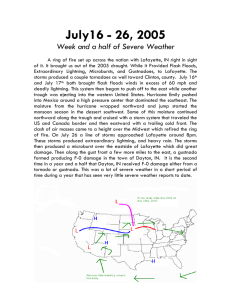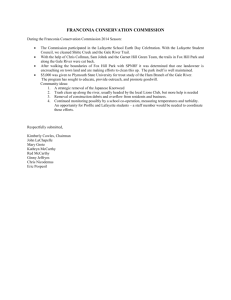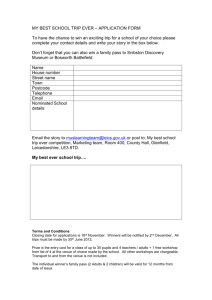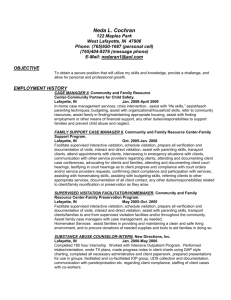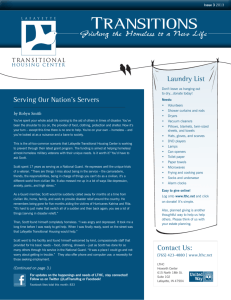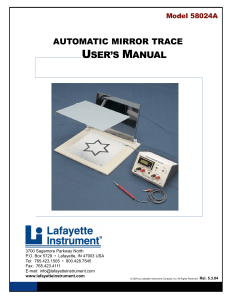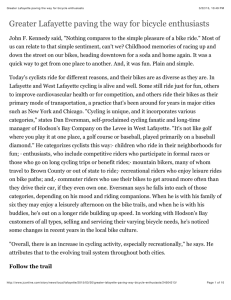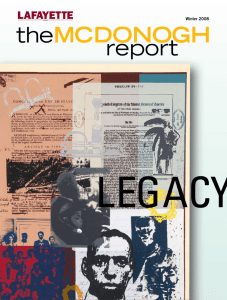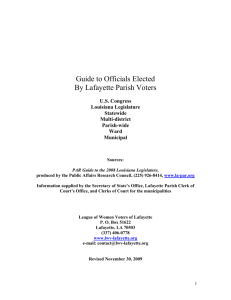syllabus - Sites at Lafayette
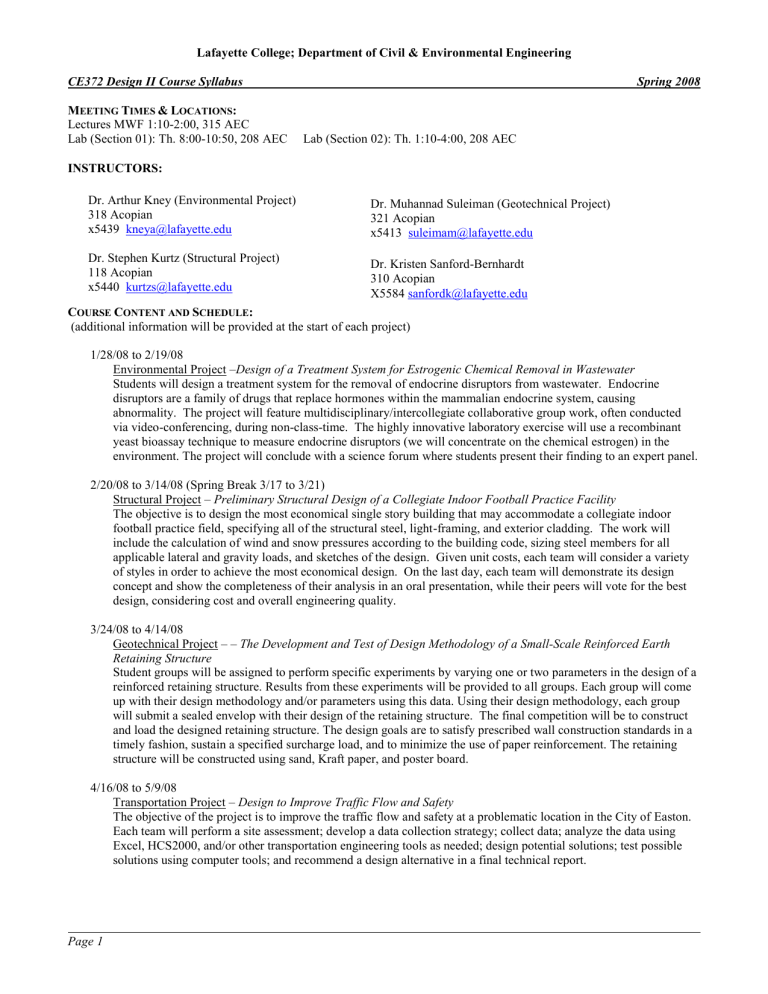
Lafayette College; Department of Civil & Environmental Engineering
CE372 Design II Course Syllabus
M EETING T IMES & L OCATIONS :
Lectures MWF 1:10-2:00, 315 AEC
Lab (Section 01): Th. 8:00-10:50, 208 AEC Lab (Section 02): Th. 1:10-4:00, 208 AEC
INSTRUCTORS:
Dr. Arthur Kney (Environmental Project)
318 Acopian x5439 kneya@lafayette.edu
Dr. Stephen Kurtz (Structural Project)
118 Acopian x5440 kurtzs@lafayette.edu
C OURSE C ONTENT AND S CHEDULE :
Dr. Muhannad Suleiman (Geotechnical Project)
321 Acopian x5413
Dr. Kristen Sanford-Bernhardt
310 Acopian
X5584 suleimam@lafayette.edu
sanfordk@lafayette.edu
(additional information will be provided at the start of each project)
Spring 2008
1/28/08 to 2/19/08
Environmental Project – Design of a Treatment System for Estrogenic Chemical Removal in Wastewater
Students will design a treatment system for the removal of endocrine disruptors from wastewater. Endocrine disruptors are a family of drugs that replace hormones within the mammalian endocrine system, causing abnormality. The project will feature multidisciplinary/intercollegiate collaborative group work, often conducted via video-conferencing, during non-class-time. The highly innovative laboratory exercise will use a recombinant yeast bioassay technique to measure endocrine disruptors (we will concentrate on the chemical estrogen) in the environment. The project will conclude with a science forum where students present their finding to an expert panel.
2/20/08 to 3/14/08 (Spring Break 3/17 to 3/21)
Structural Project – Preliminary Structural Design of a Collegiate Indoor Football Practice Facility
The objective is to design the most economical single story building that may accommodate a collegiate indoor football practice field, specifying all of the structural steel, light-framing, and exterior cladding. The work will include the calculation of wind and snow pressures according to the building code, sizing steel members for all applicable lateral and gravity loads, and sketches of the design. Given unit costs, each team will consider a variety of styles in order to achieve the most economical design. On the last day, each team will demonstrate its design concept and show the completeness of their analysis in an oral presentation, while their peers will vote for the best design, considering cost and overall engineering quality.
3/24/08 to 4/14/08
Geotechnical Project – – The Development and Test of Design Methodology of a Small-Scale Reinforced Earth
Retaining Structure
Student groups will be assigned to perform specific experiments by varying one or two parameters in the design of a reinforced retaining structure. Results from these experiments will be provided to all groups. Each group will come up with their design methodology and/or parameters using this data. Using their design methodology, each group will submit a sealed envelop with their design of the retaining structure. The final competition will be to construct and load the designed retaining structure. The design goals are to satisfy prescribed wall construction standards in a timely fashion, sustain a specified surcharge load, and to minimize the use of paper reinforcement. The retaining structure will be constructed using sand, Kraft paper, and poster board.
4/16/08 to 5/9/08
Transportation Project – Design to Improve Traffic Flow and Safety
The objective of the project is to improve the traffic flow and safety at a problematic location in the City of Easton.
Each team will perform a site assessment; develop a data collection strategy; collect data; analyze the data using
Excel, HCS2000, and/or other transportation engineering tools as needed; design potential solutions; test possible solutions using computer tools; and recommend a design alternative in a final technical report.
Page 1
Lafayette College; Department of Civil & Environmental Engineering
CE372 Design II Course Syllabus
E XPECTATIONS OF A D ESIGN C LASS :
Spring 2008
This course requires more independent work than most engineering courses. Whereas engineering courses often include homework problems with single unique answers, engineering design typically involves open-ended questions with multiple possible solutions. Engineering design often requires the designers to ask the right questions, as well as find the answers. Design work is often done in teams, with project milestones set by the team in order to ensure meeting the final project goals. Finally, independent research may be needed in order to complete the design.
G RADE B REAKDOWN :
Environmental Project
Structures Project
25%
25%
Geotechnical Project
Transportation
25%
25%
Students must receive passing grades in each project in order to receive an overall passing grade for the course
G ROUPS AND G ROUP G RADES :
The work conducted on each project will be done in groups. Typically, the members of each group will be selected by the “draft” process whereby captains will pick team members. However, the grades of individual students will not necessarily be the same throughout a group, as each instructor will assess the contribution of each individual. The manner in which individual efforts are assessed will vary from project to project.
L ETTER G RADE C ONVERSIONS :
Grade % Grade Cutoff%
A
A-
B+
B
93 to 100%
90 to 92.99%
87 to 89.99%
83 to 86.99%
C+
C
C-
D
77 to 79.99%
73 to 76.99%
70 to 72.99%
65 to 69.99%
B- 80 to 82.99%
E XAMS :
There will be no exams in this course.
F <65%
P ROJECT R EPORTS :
Typically, each project will culminate in a project report and/or presentation by each group. The requirements will vary for each project, but will be specified in each project syllabus.
A TTENDANCE P OLICY :
The attendance policy will be specified by the instructor for each project. Some projects will require attendance at evening seminars, for example. Other projects may require scheduled meetings outside of class time.
P ROJECT & C LASS E VALUATION :
After each project is completed, students will evaluate the project. After completion of the course, students will complete a general course evaluation.
O THER C OURSE N OTES :
Moles Trip - The Moles are a New York-based national honorary society for the heavy construction industry.
As such, they represent many of the largest contractors and construction projects in the world. Each year, The
Moles sponsor a trip to a New York City mega-project (typically, a multi-billion-dollar project) for engineering students in early April. This day-long trip typically covers many engineering, construction, and project management aspects of these tremendous projects. Each student in Design II is required to attend the trip and actively participate . Failure to do so will result in a 10% penalty on the final grade for the course . The trip is held primarily outdoors - wear warm clothes, coats, and sturdy shoes. Hardhats will be provided and may be kept at the end of the day.
Page 2
